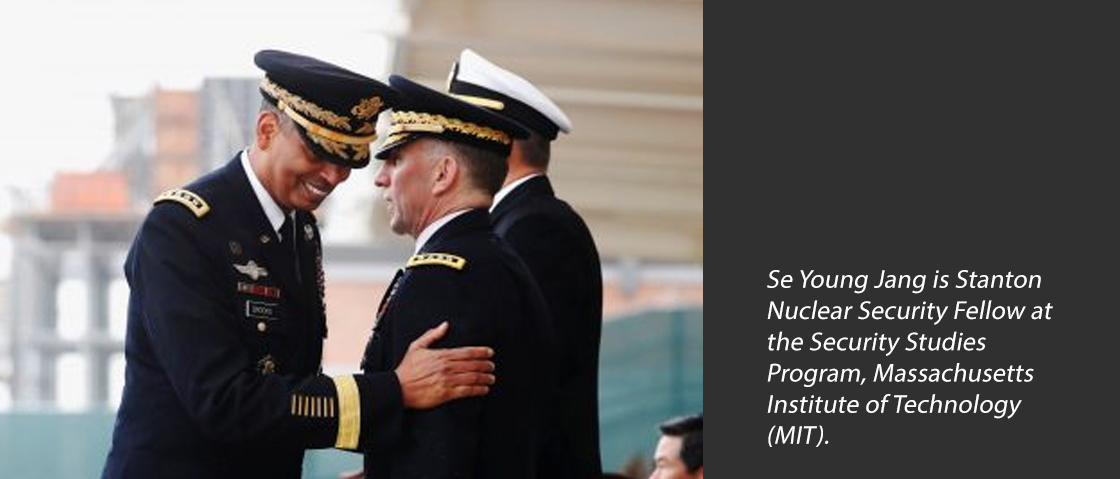Inter-Korean rapprochement, ushered in by the series of North–South summits and working-level meetings that took place in 2018, is changing the security environment on the Korean Peninsula. While reconciliation between North and South Korea develops, the latter’s relationship with the United States is running into difficulty. Seoul and Washington failed to renegotiate a defence cost-sharing agreement in 2018, which then expired on 31 December.
On 10 February 2019, after a month of extended negotiations, Seoul and Washington finally struck a deal on South Korea’s financial contributions to the non-personnel costs for the US Forces Korea (USFK). Under the new agreement, subject to South Korea’s parliamentary approval, Seoul will contribute about 1.04 trillion won (US$923 million). This amount is less than the US$1.2 billion Washington reportedly demanded. But it is an 8.2 per cent increase from 2018 when Seoul paid 960 billion won (US$850 million) for the 28,500 US troops stationed on its soil, which accounted for roughly 41 per cent of the total non-personnel costs.
The negotiations also reduced the original five-year term of the Special Measures Agreement (SMA). The Trump administration insisted upon applying a one-year limit, making it possible for the United States to demand an increase in South Korea’s share again in the near future.
Since contributing US$150 million to the USFK through the first SMA implemented in 1991, South Korea has incrementally increased its share year by year. But in 2018 Washington asked South Korea to drastically increase its contribution by 150 to 200 per cent. This radical shift in the US position was mostly driven by President Trump, who was already criticising US allies for their insufficient contributions to military costs during his presidential campaign. He once claimed Seoul paid ‘peanuts’ for the USFK ‘compared with what the US spends’.
South Korea does not agree with Trump’s claims. Seoul funded over 90 per cent of the US$10.8 billion construction costs for US Camp Humphrey, the largest overseas US military base in the world. And South Korea purchased US$19.8 billion worth of US military equipment from 2012–16, which accounted for nearly 80 per cent of Korea’s total defence imports.
A Korea Institute for Defense Analysis study also notes that the SMA does not include South Korea’s indirect support for the USFK, including ‘tax reductions or exemptions, utilities, support for base relocations and free provision of land’, which amounted to approximately US$5 billion in 2015.
Despite South Korea’s arguments against increasing its share of the USFK costs, the context in which the recent SMA talks took place was unfavourable to Seoul. South Korea is the first US ally to begin military cost negotiations with the Trump administration. Other key US allies such as Japan and NATO will enter similar talks with Washington in the coming years. The Trump administration was less likely to compromise with South Korea because this would weaken its position in future negotiations with other allies.
In a speech at the Pentagon on 17 January 2019, President Trump reiterated his intent to push ‘wealthy’ US allies to pay more. Trump’s strong stance on so-called ‘free-riding’ allies — a position shared with his domestic constituencies — has become a major element of his policy agenda, rendering US negotiators less flexible in their deals with allies.
Wary of creating any discord between the two allies that would risk disrupting the status quo on the Korean Peninsula, the South Korean government was under more pressure to accept a higher share of the costs than in previous years. Compared to the 5.8 per cent increase agreed in the 2013 SMA negotiations, the 8.2 per cent increase appeared to be hard for South Korea to accept. Still, at least Seoul managed to avoid the 40 to 200 per cent increases Washington suggested at various stages of the negotiations.
More worrisome is the one-year term that will lead the two countries to enter new SMA talks for 2020 soon after they sign the 2019 agreement. If the Trump administration’s excessive demands for defence cost-sharing continue in another round of negotiations later this year, it could erode South Korea’s trust in the United States as a reliable security partner and open the door to persistent instabilities in the bilateral alliance.
For US policymakers, South Korea’s support for US interests in East Asia could prove critical to not only sustaining the United States’ military and economic lead over China but also to pursuing the Free and Open Indo-Pacific strategy. President Trump recently signed into law the Asia Reassurance Initiative Act, authorising US$1.5 billion for increasing US security, economic interests and values in the Indo-Pacific region. But Trump’s harsh approach towards US allies could give the wrong signal to Seoul and hinder the further development of US strategic and military ties with South Korea, a central component of US policy in the region.
All this comes on the eve of the second summit between Trump and North Korean leader Kim Jong-un on 27–28 February 2019. South Korea will not immediately disrupt its relationship with the United States because the ruling Moon Jae-in administration regards cooperation between Washington and Seoul as vital to establishing peace on the Korean Peninsula. But eventually, if the United States fails to adequately signal its security commitment to South Korea and links its excessive financial demands to the possibility of a USFK withdrawal, South Korean may question the durability of their alliance.
Despite Trump denying any such withdrawal plan, ‘maybe someday’ Washington and Seoul could start negotiating a reduction or withdrawal of the USFK. Such negotiations should be based on mutual trust between the two and accompanied by a permanent peace-building process on the Korean Peninsula, along with North Korea’s sincere denuclearisation efforts. Any unilateral or abrupt decision by Washington without prior consultations with Seoul could significantly backfire.
Se Young Jang is Stanton Nuclear Security Fellow at the Security Studies Program, Massachusetts Institute of Technology (MIT).




